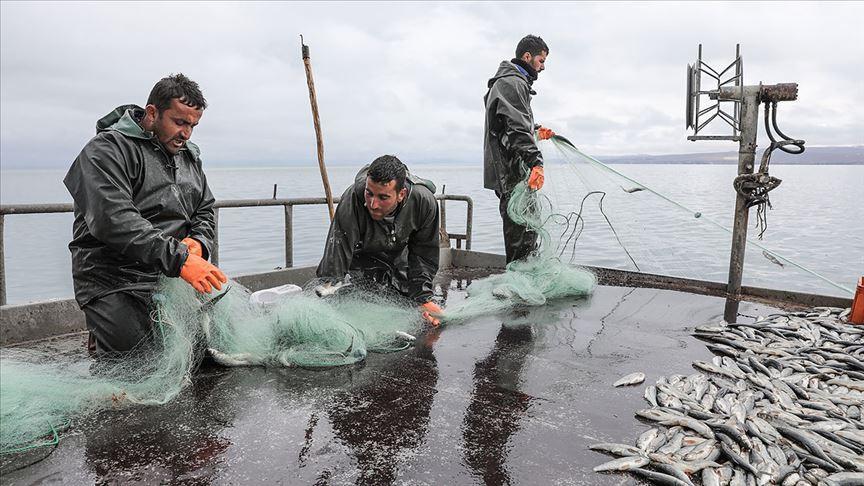
With the end of the fishing ban on July 16 in Lake Van, Turkey’s largest lake, fishermen have set off to the lake in the early hours of the morning.
Fishermen embarked on the lake from the coastal districts of the eastern provinces of Van (İpekyolu, Edremit, Tuşba, Gevaş, Muradiye and Erciş) and Bitlis (Ahlat, Adilcevaz and Tatvan), state-run Anadolu Agency reported on July 16.
The authorities introduce a 90-day-long fishing ban every year in the lake to protect the endemic species of pearl mullet (“inci kefali” in Turkish), which migrate the rivers that empty into Lake Van from April to July to spawn.
Reproduction begins two weeks after the fish enter the rivers and continues for two months. This is why fishing in the lake is banned during the season of April 15-July 15 every year. Despite the ban, some pearl mullets are still caught by simple traps set in rivers and streams.
“We have waited for this day [July 16] for the last 90 days in which the fish ban was in effect. And today the fishing ban was lifted…We hope that it will be a fruitful fishing season. We are expecting a prosperous year ahead,” said Ümit Teran, a fisherman who has earned his living from fishing in Lake Van for the last 10 years.
“We want deterrent fines regarding illegal fishing. Some 14,000 people make their livings from this fishing. This is why we need to protect this fish during their breeding period,” Teran also said.
An academic from the Faculty of Aquaculture of the Van Yüzüncü Yıl University told Anadolu Agency that the pearl mullet has been living in Lake Van for the past 800,000 years and has become an important source of income for the locals.
“For us to protect such an income, we should prevent illegal fishing during the breeding period of April-July in rivers [that empty into the lake]. If we prevent illegal fishing, we will have an opportunity to use this source in a sustainable way forever,” said Professor Mustafa Akkuş.
Akkuş said that protective measures against illegal fishing had been “very successful” this year.
“Compared with the previous years, there has been a significant fall in illegal hunting. The contribution of the provincial gendarmerie command teams is high at this point,” he said.
Pearl mullet is the only species able to survive in the salty, alkaline waters of Lake Van, and the species is found nowhere else in the world.
The pearl mullet swims upstream to spawn, moving into the freshwater rivers that feed into the lake to lay its eggs and then returning to Lake Van once the young fish have hatched.
Local residents, however, use to see the spawning period as a prime time for fishing, snapping up the pearl mullet in buckets and nets, as the fish leapt out of the water on their way upstream.
And in the mid-1990s, most of the catch was taken illegally -- during the pearl mullet’s reproductive season.
Seeing that this would soon spell the end for the fish and their livelihoods, locals in the area have since started participating in efforts to stop illegal fishing. And the amount of fish caught out of season has dropped significantly since then.
As a result, catches are up again, the average size of pearl mullet has increased, and fishermen’s incomes have spiked.